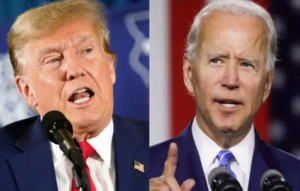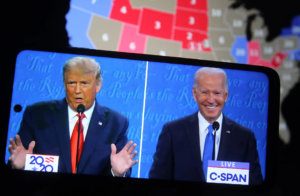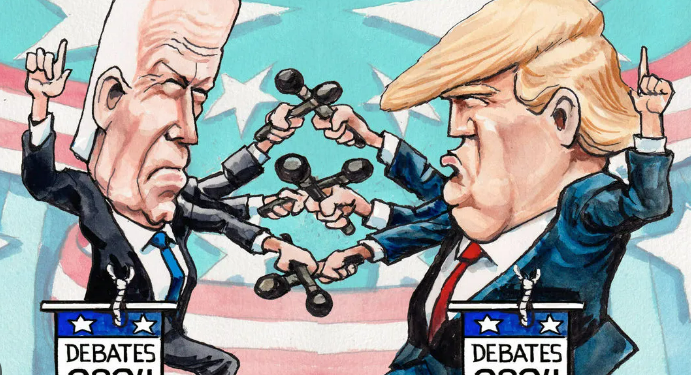US Presidential Debate between Joe Biden and former President Donald Trump will hold a crucial debate on Thursday, June 27 at 9pm ET (June 28 at 6:30am ET), a highly anticipated event that will shape the American political landscape.

With national polls showing Biden (81) and Trump (78) in a close race, and a significant portion of voters still undecided as the November 5 election approaches, the debate is therefore likely to be a turning point for both candidates.
With voters increasingly concerned about their own age and cognitive abilities, it will provide a stark comparison of the two oldest candidates ever to compete for the US presidency.
US Presidential Debate Updates
The highly anticipated debate will begin on Thursday, June 27 at 9 p.m. (1 p.m. JST). Live coverage from Atlanta, Georgia will be available on CNN, CNN International, CNN en Español, CNN Max and the CNN website.
US Election 2024: Biden Vs. Trump Debate – Check Date, Time, Moderators, And Other Key Details#USA #USElection #USElection2024https://t.co/deSZG8dqOJ
— Oneindia News (@Oneindia) June 21, 2024
Veteran CNN anchors Jake Tapper and Dana Bash will moderate the 90-minute debate, which will include two commercial breaks. The candidates have already flipped a coin to determine their standings on the podium and the order of their closing arguments.
Biden vs. Trump Debate Rules
- The Biden team chose Tails, with the president appearing on the right side of the screen and Trump on the left.
- Trump opted to speak last, leaving Biden the opportunity to make his closing argument first.
- Both candidates will stand throughout the debate, dispelling rumors that Biden asked to be seated.
- Campaign staff will be prohibited from contacting the candidates throughout the event, including during breaks.
- Each candidate will have a pen, notepad, and bottle of water, but no props or pre-written notes will be allowed.
- Unlike previous debates, microphones will be muted except when it is each candidate’s turn to speak.
- Additionally, there will be no studio audience, as CNN strives to maintain civilized discourse.
It’s a Bit Early to Debate, Right?
This is the earliest televised US election debate since 1960. It’s also the first since it wasn’t hosted by the traditional organizers, the non-partisan Commission on Presidential Debates (CPD). To explain why, let’s go back four years.
E184: in conversation with @realDonaldTrump, live on @X
(0:00) bestie intros: big house talk!
(1:37) economy: regulation, taxes, tariffs, taming inflation, de-dollarization
(12:02) federal debt: growth, spend control, where to cut, role of energy, nuclear
(20:22) foreign… pic.twitter.com/Z7JF7FRQYU
— The All-In Podcast (@theallinpod) June 20, 2024
Joe Biden and Donald Trump faced off on stage twice before the 2020 election campaign. These two debates were ugly and heated, and were widely condemned by viewers. But for months their rematch seemed all but inevitable.
Polls show most Americans aren’t happy about it. They shadowboxed for weeks, suggesting neither man wanted to debate the other. Then in May, Biden launched a challenge.
Biden vs. Trump debates beyond June 27
In May, Biden challenged Trump to two debates, and Trump quickly accepted the invitation. In addition to the debate on CNN next week, a second debate is scheduled for September 10 on ABC News. Trump has called for an additional debate with a live audience, but Biden has not agreed to the proposal.
The network said candidates must receive 15 percent by June 20 in at least four national polls by authorized networks, the traditional standard used in presidential debates in general elections. But the problem is, CNN also said candidates must qualify for the election in states that will receive a total of 270 electoral votes.

According to Politico, RFK Jr. is currently on the ballot in only four states, and while his team’s efforts to qualify in other states are going better than expected, they likely won’t be able to do so in time for the debate in late June.
President Trump has said in recent months that he would debate Biden whenever and wherever he wanted. But Biden has been reluctant to make such a decision, consistent with a White House strategy to tightly control Biden’s attendance at key hearings.











